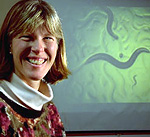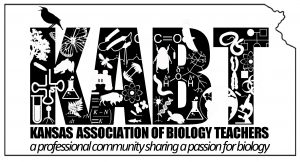Dr. Cynthia Kenyon to Speak in Lawrence
Higuchi Memorial Lecture
KU School of Pharmacy, room 2020
Thursday, October 6th
5:30 pm
In 1993, Cynthia Kenyon and colleagues’ discovery that a single-gene mutation could double the lifespan of the tiny roundworm C. elegans sparked an intensive study of the molecular biology of aging. Aging had long been assumed to be a passive consequence of molecular wear and tear. Kenyon was skeptical of this idea, thinking that something as universal and fundamental as aging might well be subject to control by the genes. Kenyon’s discoveries have led to the realization that there exist genetic control circuits for aging, involving hormones as well as proteins that regulate the activities of entire groups of cell-protective genes. The long-lived mutants Kenyon and others have identified are resistant to many age-related diseases, raising the possibility of a new strategy for combating many diseases all at once: targeting aging itself. By manipulating genes and cells, Kenyon and her colleagues extended the lifespan of healthy, active C. elegans by six fold, demonstrating the extraordinary plasticity of aging.
Cynthia Kenyon graduated valedictorian in chemistry and biochemistry from the University of Georgia in 1976. She received her PhD from MIT in 1981 and then did postdoctoral studies with Nobel laureate Sydney Brenner at the MRC Laboratory of Molecular Biology in Cambridge, UK, studying the development of C. elegans. Since 1986 she has been at the University of California, San Francisco, Department of Biochemistry, where she was the Herbert Boyer Distinguished Professor and is now an American Cancer Society Professor. Dr. Kenyon has received many honors and awards for her findings. She is a member of the US National Academy of Sciences, the American Academy of Arts and Sciences, and the Institute of Medicine and she is a past president of the Genetics Society of America. She is now the director of the Hillblom Center for the Biology of Aging at UCSF.
Links of Potential Interest
-
Nature Insight Article written by Dr. Kenyon: http://www.nature.com/nature/journal/v464/n7288/pdf/nature08980.pdf
-
Wikipedia Page: http://www.youtube.com/watch?v=9_cDv9j7MVg
-
Kenyon Laboratory Page: http://kenyonlab.ucsf.edu/
and if you or your students can’t make the lecture, here are some YouTube videos they may enjoy (I am not sure why I can no longer embed them in the post)…
http://www.youtube.com/watch?v=dJujGfGYpNQ
http://www.youtube.com/watch?v=DT4PWu43e9U
http://www.youtube.com/watch?v=HxfLm30FHwA
http://www.youtube.com/watch?v=9_cDv9j7MVg
Hope to see you there!

